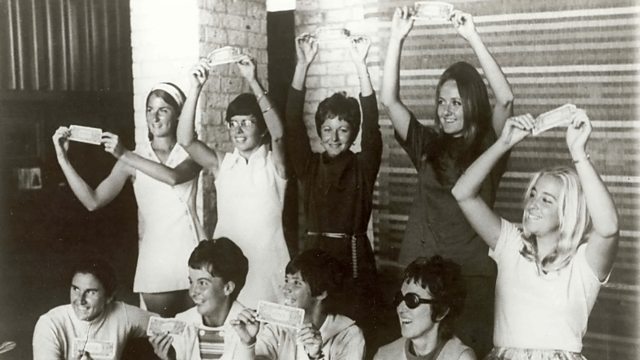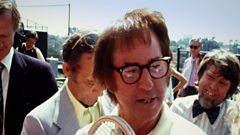
The Legend of Billie Jean King - Battle of the Sexes
Film telling the story of what happened when, in 1973, tennis star Billie Jean King agreed to face former world champion and self-proclaimed male chauvinist pig Bobby Riggs.
Storyville tells the riveting story of what happened when, in 1973, tennis star Billie Jean King agreed to face former world champion and self-proclaimed male chauvinist pig Bobby Riggs. It was a tennis match that gripped the world, a culmination of the struggle for equal rights that King and other female tennis players had been demanding for years.
Through scintillating match footage, archive and interviews with key tennis players and pundits, the film tells the interrelated stories of the birth of women's professional tennis and the growth of the women's liberation movement from the 60s. The forcefully contrasting characters of the focused King and buffoonish Riggs make for a highly entertaining watch and climactic ending.
A defining moment in the history of tennis and society at large.
Last on
More episodes
Clip
-
![]()
Bobby Riggs throws down the gauntlet
Duration: 02:07
The Legend of Billie Jean King - The Battle of the Sexes directors James Erskine and Zara Hayes answer the Storyville Q&A
JAMES: I’m probably not being original here, when I write both. Lenin once said, “Theory without practice is sterile. Practice without theory is madness.” I think the same could apply to filmmaking, with a little twist, “Story without character is sterile. Character without story is impossible.” In truth it’s story that moulds character in the first place, in the case of Billie Jean King or Bobby Riggs, it was the story of their childhoods that moulded their characters. Billie as a kid who suffered prejudice as a woman, Bobby as a guy whose poverty forced him to find innovative ways of making money. Their characters then shaped their story going forward, as it dictated how they would respond to the world around it, and own it for themselves. In Billie’s case she made the fight against prejudice her story, in Bobby’s case making money was the story, the fact that his character made him an entertaining showman is what brought him to the public eye.
ZARA: I tend to respond more to character overall, though the two are so closely linked that it is difficult to tease them apart.�� Ultimately, I think that films work best when we manage to find the right journey for a particular character to embark upon. Billie Jean King is a classic hero (or "shero" as she prefers), who is undergoing the biggest challenge of her life to date, and we're with her along the way to experience that turbulent journey and ultimately bask in her victory at the end.�� It's also very important in this story that Bobby Riggs is so amusing and compelling as an antagonist, because it allows the tone to be uplifting. We never wanted to make a dry, campaigning film; we wanted it to play out almost like a romantic comedy, and for people to leave the cinema feeling inspired.
What made you first want to explore the subject?
JAMES: I was interested in how sports might impact on the battle for equality, the so-called level playing field. It struck me that in sport where success really relies on aptitude and skill, there was a greater range of heroes than in, say business, or film-making or acting, where there’s arguably less opportunity for people of colour, for women (only 6% of directors are women), for those from lower income backgrounds. That got me thinking how to make a film about women’s sports and I had a vague memory that there had been a match called “The Battle of the Sexes”, though what I remembered were some lame re-runs in the 80’s – when we dug into it, we found the original Battle of the Sexes was a real ace. Character, story and message. An event that changed the world.
ZARA: I had been interested in directing something about the women's movement for a while, but I wanted to find a hook that is filmic and entertaining.�� I had no interest in tennis whatsoever (I didn't understand the rules!) but when James told me about this match and showed me a clip from the original broadcast, I knew immediately that I wanted to be involved in bringing this to the screen.�� Also I loved the idea of being able to make a "sports" film that was about something much bigger.
��
How long did it take to get the film off the ground?
JAMES: About six months, not so long. We began to get the Women’s Tennis Association, the Bobby Riggs Estate and, of course, the heroine, Billie Jean on board. I tend to hustle films into production and was able to put it together with pots of cash from here and then. The fact that it was going to be the 40th anniversary of the eponymous match clarified people’s minds. It was now or never.
ZARA: What made it happen was that there was an important tennis tournament taking place in Charleston, where the Original 9 would be in attendance. We all decided it was too great an opportunity to miss, and our backers took the decision to send us over there. We shot some crucial interviews that week, and it was a great leap of faith on their part to have done that.
What were you most surprised to learn in the course of production?
JAMES: Just how chauvinistic my Dad’s generation were.
ZARA: That a woman couldn't get a credit card in her own name without a man to underwrite it until the 1970's in America.
��
What have been the differences in reception to the film in countries it has now travelled to?
JAMES: It’s had a strong reception. I think that people are genuinely shocked at the attitudes people had. But it’s an easy watch because it has comedy. I showed it at Doc Aviv in Israel a couple of weeks ago, and it was strange because I hadn’t actually watched the film since it’s UK premiere in June last year. It’s a crowd-pleaser that makes you think. I think entertainment is a critical part of documentary and I think this film does that, wherever it plays. As well as making people think.
ZARA: It has had a great reception so far. Of course, tennis is such a huge sport internationally that it finds an audience, which is great, but I've also been inspired by the response to the equal rights issues raised. We got approached by a LGBT film festival in Russia last week, and I'm really hoping it screens there. I would love to take it to countries where women's tennis is just starting to emerge.
��
Which documentary has most inspired you?
JAMES: “When We Were Kings”, the famous film about Muhammad Ali taking on George Foreman in “The Rumble in the Jungle”. It really got me thinking about feature length documentary and sport and its place in culture.
ZARA:�� Seeing "Hoop Dreams" was a real turning point for me - it charts the story of two high school students from Chicago who have dreams of becoming professional basketball players, filmed over five years. I only just recently realised that it's technically a "sports film" - I'd never made that connection before, because I was so absorbed by the human stories.
Favourite Website/blog?
JAMES: No prizes for originality in saying The Guardian website. Film journos I like are Jason Solomons and Mark Kermode.
ZARA: I like to check Deadline.com to see what's going on in Hollywood
��
Person you’d most like to interview (living or dead?)
JAMES: I can’t just name one. But Orson Welles would be on the list.
ZARA:�� As a documentary-maker, I could obviously interview people for the rest of my life and never get bored, but at the moment I'd love to be able to interview Werner Herzog and Hilary Clinton.
Best piece of filmmaking advice you’ve ever been given?
JAMES: That a documentary is not a whole book, it’s like a feature article for a broadsheet newspaper – so tell the bits you want to tell and matter most to you, not the whole thing. That was Nigel Williams who was a �鶹������ҳ��� executive on the long-running and sorely missed “Omnibus” strand; he’s also a great writer.
ZARA: It's probably something I got from Billie Jean King from a sportsperson’s perspective: "Champions adjust". It's the same with filmmaking: you have to be flexible and nimble and constantly re-inventing your strategy to achieve the results you want, so I think the same applies!
Best piece of filmmaking equipment you can’t live without?
JAMES: Final Cut Pro.
ZARA: Geek-alert here, but I couldn't live without Evernote - an App that allows you to "clip" web pages, images, text and store them in virtual "notebooks".
Favourite film of all time?
JAMES: THE THIRD MAN
ZARA: I have lots of favourite films, from different genres and eras.�� In the last year, Alexander Payne's "Nebraska" and Paolo Sorrentino's "La Grande Bellezza" had the most profound effects on me.
Most difficult access?
JAMES: Goodness. It’s all difficult isn’t it. I just released in cinemas my latest film “Pantani: The Accidental Death of a Cyclist” and that was two years of ongoing negotiations with Marco Pantani’s family who are lovely but protective over their Tour de France winning son’s memory. I had some sleepless nights.
ZARA: Getting access to film inside a maximum security prison in Indiana to film a juvenile prisoner being held in an adult prison for 12 Year Old Lifer - it was an incredibly sensitive subject.
Best recent read?
JAMES: I liked Rana Dasgupta’s “Solo” as a portrait of 20th century life. He has a unique voice.
ZARA: I just read a compilation of the Best American Magazine Writing for 2013. There was one particular article, The Innocent Man by Pamela Colloff, which was tragic, gripping, outrageous and incredibly moving. It’s about a man from Texas who was falsely imprisoned for his wife's murder.
Credits
| Role | Contributor |
|---|---|
| Director | James Erskine |
| Director | Zara Hayes |
| Series Editor | Nick Fraser |
Broadcasts
- Sun 22 Jun 2014 21:00
- Mon 23 Jun 2014 01:55
- Thu 26 Jun 2014 00:00

